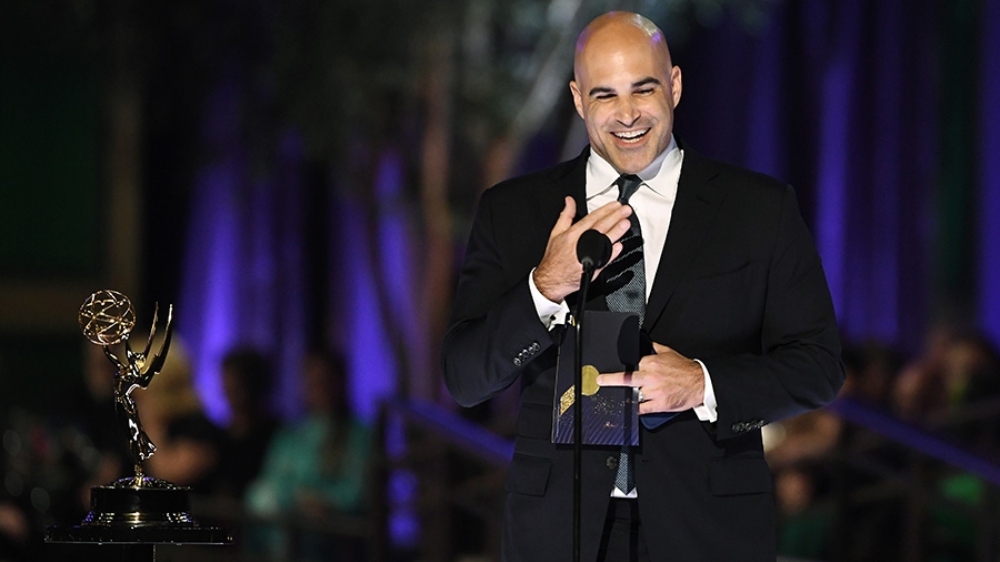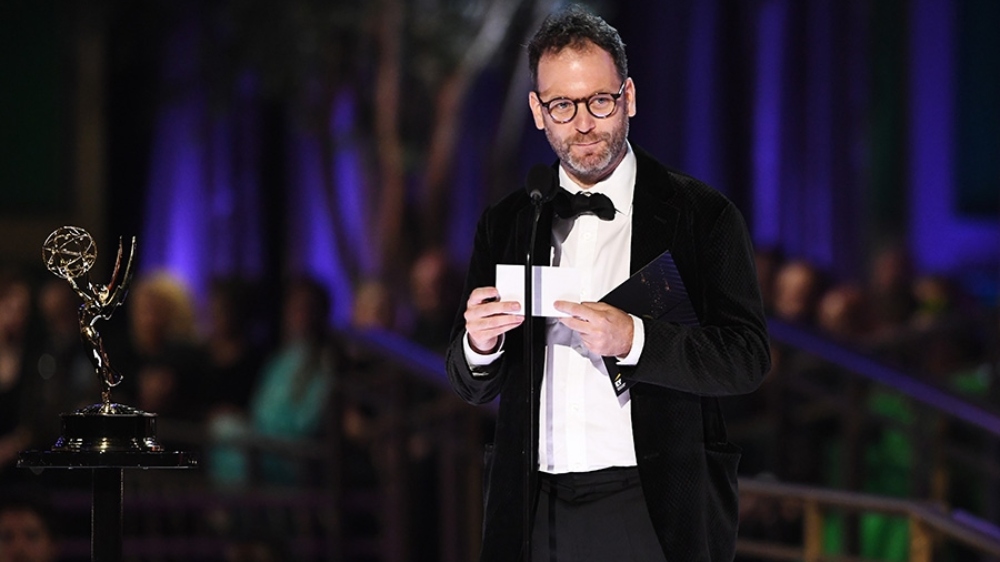
Randy Rainbow was one of the hosts on the first night of the two-part Creative Arts Emmy weekend, dressed in a sparkling tuxedo, and singing — to the tune of “It Had To Be You,” the words “It Had to Be Crew.”
He paused during some of the lyrical play to note “I didn’t write it,” as he sang the paean to hard-working below-the-liners, adding that, given the song’s age, “that public domain tune makes everything cheaper.”
A short while later, he came backstage, for indeed, the Creative Arts Emmys are a bit looser than their Oscar counterparts: Presenters are available for Q&A sessions (if anyone in the media room indicates they have any “Q’s” — and we don’t mean a tapestry of unhinged conspiracy theories), winners can bring their kids up to the stage when accepting an award (well, that happened once), and the humble press minions aren’t mandated to wear formal wear. We must simply look presentable.
Which might, under some circumstances, present its own challenges. In any case, none of us were going to look as natty in a sparkling tux.
We asked Mr. Rainbow — as the NY Times would refer to him — about his own crew for his increasingly ubiquitous musical spoofs, who he called “incredible,” particularly thanking the music director who “helped me migrate from the karaoke tracks I was ripping off,” back when he was “some weirdo who makes videos out of a converted bedroom in his apartment.”
He mentioned that our present dystopic times have left “no shortage of material for the last six years,” and gets an idea for a new tune “every time I tune into the news. Despite the horrific and infuriating events that inspire these videos (they’re) really a coping mechanism. It’s a terrible time for our country — but great for my career.”

This theme was echoed during the next evening’s raft of awards, when you could see the early signs of how well White Lotus was going to perform in the above-the-line categories, as Mike White‘s HBO show won for its captivating score, casting, and sound mixing, along with John M. Valerio for “Single-Camera Picture Editing for a Limited or Anthology Series or Movie.”
Given that The White Lotus was famously shot in a quarantine bubble at a Hawaiian resort being otherwise unused during the pandemic, we asked Valerio if he was inside or outside that bubble while working with fellow Emmy winner White, and the answer turned out to be… both!
He was initially at “home cutting remotely (having) a lot of email conversations,” with White, to save time later. “Once they wrapped I had the great fortune of moving to Kauai,” where White also has a home. Indeed, “the entire post-production team moved to Kauai.”
There, he worked “face-to-face with Mike,” though remotely with everyone else, including the color timers, etc. Valerio was able to bring his family, and found himself in “some kind of resort condo complex — (with) the sweetest editing setup I ever had.”
He also had to undergo the same 10-day quarantine that the cast and production crew of White Lotus did earlier but allowed that “being there during the pandemic — we experienced the island like no one ever has. I feel like it was such a trying time for so many — [yet] it was one of the best times I’ve had in my life.”
That best of times/worst of times theme, of course, continues to permeate both the world in general, and showbiz in particular, in the midst of record box office hauls even as major theater chains declare bankruptcy, just as many are calling this the golden age of television even as streaming services are hemorrhage subscribers, and studios continue layoffs.

It was also encapsulated, in miniature, for the evening’s winner in the music supervision category, where Stranger Things’ Nora Felder added to the show’s string of craft wins, for the episode that featured its now iconic use — or re-use, rather — of Kate Bush’s Running Up That Hill.
Felder talked about “kismet placements” in shows, the way the series’ use of the Bush tune, and the use of Metallica’s Master of Puppets, “keeps the door open for more placements of timeless music,” including songs that were either lesser known at the time or have fallen out of rotation on oldies radio (“Pass the Dutchie,” for example, was in that same episode Felder won for).
Your BTL correspondent asked what she thought of the ongoing struggle to get music supervisors unionized, and she allowed as to how Stranger Things’ recent flurry of soundtrack-related headlines “does show the significance of the job. I think that unionizing will help a lot of the newer people that come into the fold. We don’t have benefits, and we don’t have a lot of things. Right now, from what I’m getting [management is] paying attention, they’re hearing that something’s gotta change.
“I hope that everyone can come together and come to an agreement on something that makes us feel like we’re protected. I don’t think anyone is asking for anything that isn’t fair. Everyone just wants to be treated fairly — like the heads of all the other departments.”
Or more recently, railroad workers who just want to be able to see a doctor when they’re sick. Felder said that “when the pandemic hit [we wondered] what do we do now? We don’t have any coverage or anything, Let’s hope,” she said of the organizing efforts.
Indeed. And while Randy Rainbow also sarcastically admonished the TV Academy — perhaps showbiz in general — “don’t change bitches, I love you,” change is clearly afoot.

Well, maybe not everywhere. Single-camera one-hour cinematography winner Marcell Rév, who won for his work on Euphoria, talked about not only his shorthand with series producer/director Sam Levinson but also their commitment to shooting on film.
“We shot different film stocks,” he said of the most recent season, “and while the aesthetic seems to be contemporary, we have a very classical approach to it, using very simple old school tools — a lot of tungsten lights, dollies (along with ArricamLTs, Cooke S4s, and Zeiss Super Speed glass, etc.) “In my opinion, film is the best to capture a person’s face.”

Classical filmmaking tools aside, the world is still going through a lot of what might be called “Breakthrough Pain” — the name of the very episode in Dopesick that Checco Varese, ASC, won his Emmy for that same Sunday night, for cinematography in that same Anthology/Series/Movie category that was also so kind to White Lotus.
In a statement later, Peruvian-born Varese said the award “honors all the victims who suffer from the greed and avarice of those who think power and money are more important than a single life.”
Which, since it’s been that way for so long, makes “don’t change, bitches” both more cynical, and, of course, the easier way to go for those convinced their own power will never desert them. But as Hollywood union members, unrepresented crew, and lately, those aforementioned railroad workers, along with nurses, teachers, and many others, are showing, change — however slow, painful, or overdue — is gonna come.
One way or another.
Which sounds like a good idea for a usable music cue.
 Mark London Williams is a BTL alum who currently covers Hollywood, its contents and discontents, in his recurring “Across the Pond” dispatch for British Cinematographer magazine, contributes to other showbiz and production-minded sites, and musters out the occasional zombie, pandemic-themed, or demon-tinged book and script, causing an increased blurring in terms of what still feels like “fiction.”
Mark London Williams is a BTL alum who currently covers Hollywood, its contents and discontents, in his recurring “Across the Pond” dispatch for British Cinematographer magazine, contributes to other showbiz and production-minded sites, and musters out the occasional zombie, pandemic-themed, or demon-tinged book and script, causing an increased blurring in terms of what still feels like “fiction.”
Mark London Williams’ Union Roundup column will appear every Tuesday. You can reach him to give him tips and feedback at [email protected]. He can also be found on Twitter @TricksterInk.





